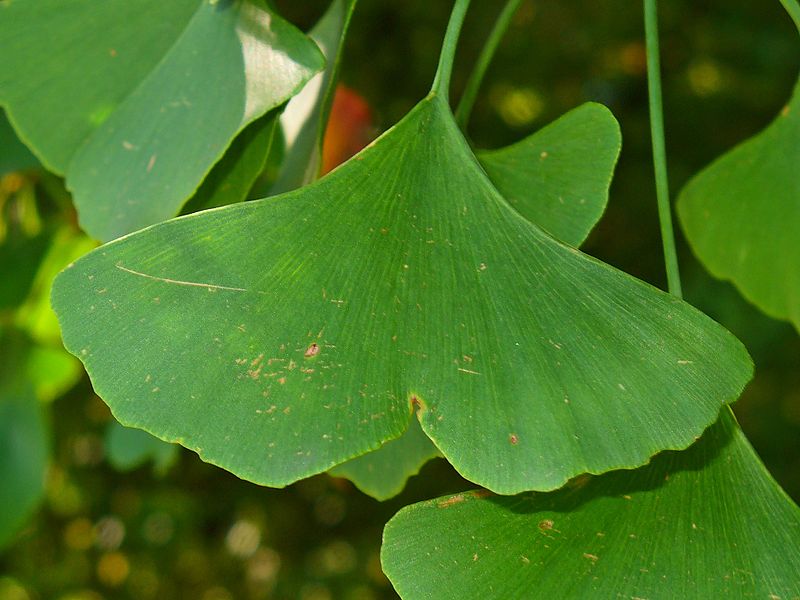Why Take Gingko?
The Gingko biloba leaf, sourcing from the Chinese Ginkgo tree, is the herb that is collected to create an extract; a common form used in dietary supplements. Ginkgo seeds are also often served in traditional Chinese food. Ginkgo is commonly used in traditional medicine as an herb that is proposed to enhance cognitive function. Athletes may take Ginkgo biloba in an effort to increase overall performance in sports, which is partially dependent on motor control, coordination, decision-making, timing, and other cognitive functions.
|
Influence on Health
The active compounds in Ginkgo biloba include flavonoids, terpenoids, and terpene lactones; which have been suggested to increase cerebral blood flow, reduce blood viscosity, scavenge free radicals, and modify neurotransmitter systems (Ude, Schubert-Zsilavecz, & Wurglics, 2013). Researchers have also observed that the flavonol quercetin, a major component of Ginkgo extracts, reduces learning and memory impairment in cerebral ischaemic rodents (Pu et al., 2007). However, research examining the effects of Ginkgo biloba intake during sports and exercise is limited. Some research states there currently is insufficient evidence to conclude that Ginkgo benefits sports-related motor skill or cognitive performance (Baker, Nuccio, & Jeukendrup, 2014), other researchers have observed that Ginkgo biloba improves exercise performance, evaluated by walking distance, in patients with peripheral arterial disease (Williams, 2006). More research needs to be conducted to determine if there is a cognitive-enhancing effect of Ginkgo biloba for healthy young athletes. Ginkgo biloba is currently not banned by the IOC (WADA) or the NCAA.
According to the National Center for Complementary and Alternative Medicine (NCCAM), common side effects of Ginkgo biloba include headache, nausea, GI distress, diarrhea, dizziness, or allergic skin reactions. Some research suggests that ginkgo can increase bleeding risk. Therefore, any anticoagulant drug is a contraindication for supplementing with ginkgo biloba.While Ginkgo biloba is a safer alternative to taking prescription drugs, however, until more research examines the effects of Ginkgo on athletic performance, there are alternative and more effective methods to enhance cognitive function.
According to the National Center for Complementary and Alternative Medicine (NCCAM), common side effects of Ginkgo biloba include headache, nausea, GI distress, diarrhea, dizziness, or allergic skin reactions. Some research suggests that ginkgo can increase bleeding risk. Therefore, any anticoagulant drug is a contraindication for supplementing with ginkgo biloba.While Ginkgo biloba is a safer alternative to taking prescription drugs, however, until more research examines the effects of Ginkgo on athletic performance, there are alternative and more effective methods to enhance cognitive function.
References
Baker, L. B., Nuccio, R. P. and Jeukendrup, A. E. (2014), Acute effects of dietary constituents on motor skill and cognitive performance in athletes. Nutr Rev, 72: 790–802. doi:10.1111/nure.12157
Pu, F., Mishima, K., Irie, K., Motohashi, K., Tanaka, Y., & Orito, K. et al. (2007). Neuroprotective Effects of Quercetin and Rutin on Spatial Memory Impairment in an 8-Arm Radial Maze Task and Neuronal Death Induced by Repeated Cerebral Ischemia in Rats. Journal Of Pharmacological Sciences, 104(4), 329-334. http://dx.doi.org/10.1254/jphs.fp0070247
Ude, C., Schubert-Zsilavecz, M., & Wurglics, M. (2013). Ginkgo biloba Extracts: A Review of the Pharmacokinetics of the Active Ingredients. Clin Pharmacokinet, (52), 727–749. http://dx.doi.org/10.1007/s40262-013-0074-5
Williams, M. (2006). Dietary Supplements and Sports Performance: Herbals. Journal Of The International Society Of Sports Nutrition, 3(1), 1. http://dx.doi.org/10.1186/1550-2783-3-1-1
Pu, F., Mishima, K., Irie, K., Motohashi, K., Tanaka, Y., & Orito, K. et al. (2007). Neuroprotective Effects of Quercetin and Rutin on Spatial Memory Impairment in an 8-Arm Radial Maze Task and Neuronal Death Induced by Repeated Cerebral Ischemia in Rats. Journal Of Pharmacological Sciences, 104(4), 329-334. http://dx.doi.org/10.1254/jphs.fp0070247
Ude, C., Schubert-Zsilavecz, M., & Wurglics, M. (2013). Ginkgo biloba Extracts: A Review of the Pharmacokinetics of the Active Ingredients. Clin Pharmacokinet, (52), 727–749. http://dx.doi.org/10.1007/s40262-013-0074-5
Williams, M. (2006). Dietary Supplements and Sports Performance: Herbals. Journal Of The International Society Of Sports Nutrition, 3(1), 1. http://dx.doi.org/10.1186/1550-2783-3-1-1



